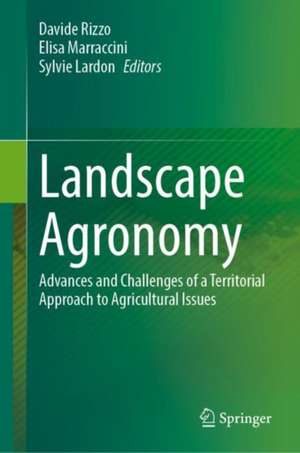Landscape Agronomy: Advances and Challenges of a Territorial Approach to Agricultural Issues
Editat de Davide Rizzo, Elisa Marraccini, Sylvie Lardonen Limba Engleză Hardback – 10 sep 2022
This book covers the background that improved the transdisciplinary interface of agronomy with spatially-explicit disciplines like landscape ecology and geography both in research and in training programs, in addition to some experiences of participative landscape management. On these bases, the state of art on cutting-edge data availability and methodological issues is used to select and discuss some worldwide case studies.
This selection of research topic examples underpins the concluding discussions about challenges ahead. Researchers as well as policy and decision makers are the main target of this book that seeks to provide a toolbox of concepts, examples and ideas to improve the understanding of agricultural landscapes. Agricultural activities manage the greatest share of land surface on Earth with fast-paced changes compared to any other human land use. With this book we aim at providing a stronger interface between agricultural science and landscape design processes.
Preț: 952.09 lei
Preț vechi: 1161.08 lei
-18% Nou
Puncte Express: 1428
Preț estimativ în valută:
182.22€ • 189.50$ • 152.48£
182.22€ • 189.50$ • 152.48£
Carte disponibilă
Livrare economică 21 februarie-07 martie
Preluare comenzi: 021 569.72.76
Specificații
ISBN-13: 9783031052613
ISBN-10: 3031052617
Pagini: 294
Ilustrații: XIX, 294 p. 55 illus., 41 illus. in color.
Dimensiuni: 155 x 235 mm
Greutate: 0.64 kg
Ediția:1st ed. 2022
Editura: Springer International Publishing
Colecția Springer
Locul publicării:Cham, Switzerland
ISBN-10: 3031052617
Pagini: 294
Ilustrații: XIX, 294 p. 55 illus., 41 illus. in color.
Dimensiuni: 155 x 235 mm
Greutate: 0.64 kg
Ediția:1st ed. 2022
Editura: Springer International Publishing
Colecția Springer
Locul publicării:Cham, Switzerland
Cuprins
Chapter 1. Agriculture at the Landscape Level: Scientific Background and Literature Overview.- Part 1. Observing.- Chapter 2. Agrometeorological Services for Landscape Agronomy: The Italian Case in the European Context.- Chapter 3. Availability and Integration of Agro-Environmental Data: the French case.- Chapter 4. A Method to Assess the Fragility of a Terraced System as an Example of Landscape Agronomic Analysis.- Part 2. Understanding.- Chapter 5. Exploring Futures in Landscape Agronomy: Methodological Issues and Prospects of Combining Scenarios and Spatially Explicit Models.- Chapter 6. Aligning Governance of Quality with Quality Management Systems in Territory-based Agrifood Chains.- Part 3. Supporting Action.- Chapter 7. Innovation in Education and Training: Insights from New Integrative Approaches.- Chapter 8. Innovative Governance and Participatory Research for Agriculture in Territorial Development Processes. Lessons from a Collaborative Research Program (PSDR).- Chapter 9. Guiding Multifunctional Landscape Changes Through Collaboration – Experiences from a Danish Case Study.- Chapter 10. Landscape Agronomy: Lessons Learned and Challenges Ahead, from a European Perspective.
Notă biografică
Davide Rizzo is an agronomist, characterizing the spatial organization of cropping systems and farming practices at the landscape level to understand the related impact on natural resources. Dr. Rizzo uses different disciplinary approaches ranging from geographical analyses, knowledge capitalization and data-mining of statistical surveys.
Elisa Marraccini is an associate professor in Agronomy and Crop Science at the University of Udine, Italy. Her main research interests are the design and assessment of sustainable cropping and farming systems in different contexts and the understanding of the land use trajectories at the farm, landscape and regional levels.
Sylvie Lardon is a senior scientist at INRAE and associated professor at AgroParisTech, at Clermont-Ferrand, France. Her research focuses mainly on the development and use of qualitative spatial models to build shared visions and improve actors’ participation in territorial projects.
Textul de pe ultima copertă
The landscape is widely identified as a relevant target both by integrative policies and across the disciplines dealing with resource management and territorial planning. Landscape agronomy promotes a greater involvement of agricultural sciences into this arena by increasing the attention on the dynamics relating the farming practices to the natural resources and the temporal and spatial patterns of land covers.
This book covers the background that improved the transdisciplinary interface of agronomy with spatially-explicit disciplines like landscape ecology and geography both in research and in training programs, in addition to some experiences of participative landscape management. On these bases, the state of art on cutting-edge data availability and methodological issues is used to select and discuss some worldwide case studies.
This selection of research topic examples underpins the concluding discussions about challenges ahead. Researchers as well as policy and decision makers are the main target of this book that seeks to provide a toolbox of concepts, examples and ideas to improve the understanding of agricultural landscapes. Agricultural activities manage the greatest share of land surface on Earth with fast-paced changes compared to any other human land use. With this book we aim at providing a stronger interface between agricultural science and landscape design processes.
Caracteristici
Presenting the first large overview of this emerging perspective in agronomy Exploring the cutting-edge of data availability and processing methods Tests a theoretical framework for scientists to support policy and decision makers
